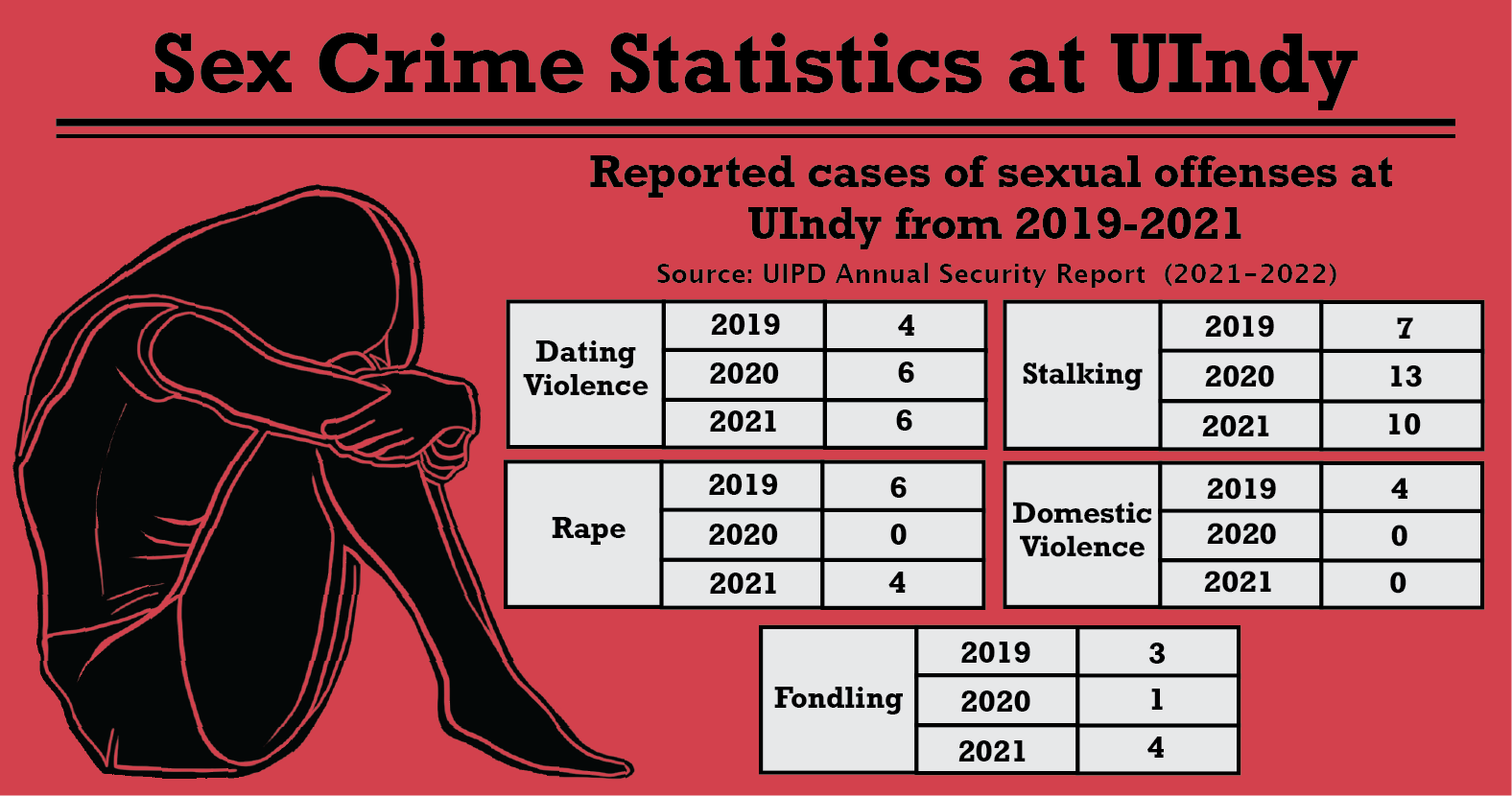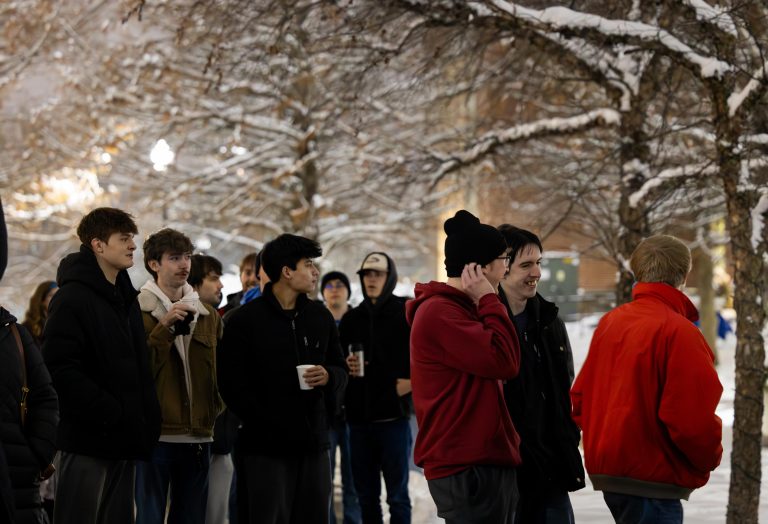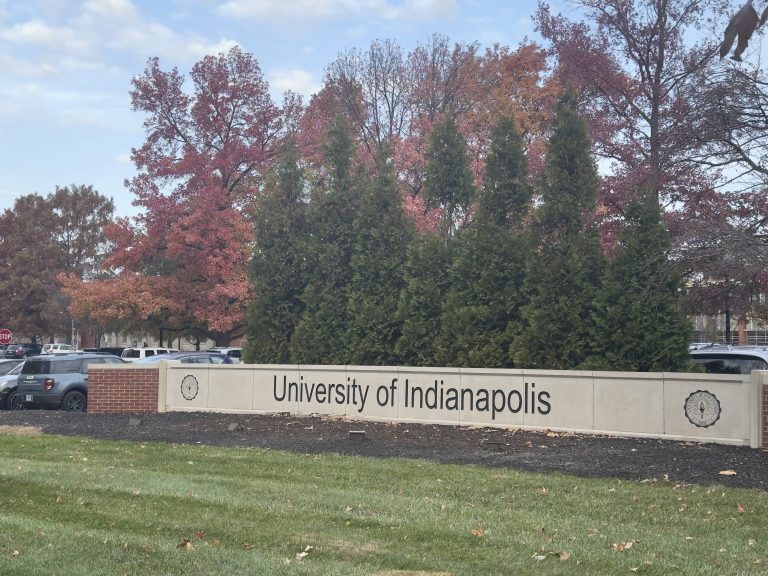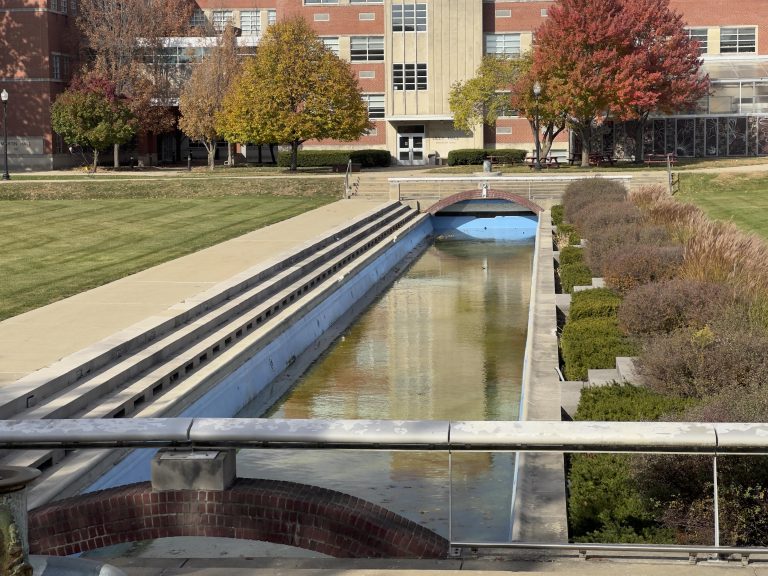Editor’s note: This article may contain upsetting content related to sexual assault, crimes and violence. Please visit your nearest emergency room or call the Suicide and Crisis Lifeline at 988 or the National Sexual Assault Hotline at 1-800-656-4673 if you need help.
The University of Indianapolis released the Annual Security Report and Annual Fire Safety Report for the 2021-22 academic school year. The Clery Act requires colleges and universities that receive federal funding to disseminate a public security report by Oct. 1 annually, according to the Clery Center’s website.
The report details the crimes reported on campus, fire safety measures put in place, steps for reporting crimes and safety efforts. The report of statistics for reported crimes on campus and in the vicinity, also known as the Clery Security Report, compared the crimes for 2021 to the years 2020 and 2019. The specific sex crimes reported included instances of rape, fondling, stalking, dating violence and domestic violence. According to Page 19 and 26 of the report, there were four rapes reported in 2021 compared to zero in 2020 and six in 2019. Four cases of fondling were reported in 2021, an increase from 2020 (1) and 2019 (3). In 2021, 10 cases of stalking were reported versus 13 in 2020 and seven in 2019. In 2021, six total reported incidents of dating violence occurred compared to six in 2020 and four in 2019. There were no reported instances of domestic violence for 2020 through 2021 and statutory rape or incest on campus for 2019 through 2021.
UIndy’s Chief of Police David Selby said it is important to know that the report is always a year behind the current school year and that the decrease in sex crimes reports is likely due to a decrease in the number of students.
“We’re probably looking at a decrease because of a decrease in the number of students that would be on campus,” Selby said. “But we don’t typically have a lot of sexual assault anyway. It really depends on the [incoming] class…what they partake in, where they go to party, [if] they go [to downtown Indianapolis.]”
According to Selby, the number of sex crimes reported also correlates to the consumption of drugs and alcohol on campus. Selby, who has been Chief of Police at the University of Indianapolis since 1993, said he believes there is another reason for crimes occurring on campus.
“I want to tell you this, and my colleagues would tell you this: the number of serious crimes we see is because of residents bringing [outside] people onto campus,” Selby said. “Our Title IX coordinator is amazing, but it really comes down to the choices you’re willing to make.”
According to Senior Associate Dean of Students and Title IX Coordinator Jessica Ward, the decrease in sex-related crimes reported is due to the 2020 changes in Title IX regulations.
“August of 2020 is when the new regulations [from] the Trump era administration came in,” Ward said. “Now there has to be a formal hearing, unless it’s two students and they can come to an informal resolution, and that has yet to happen. Then that hearing has to be where they’re face to face. So could it be that people don’t want to go through that process? It could be because that process is very different [from] the process it was before, right?”
The process for preventing and prosecuting sex crimes includes a system between the UIndy Police Department, the Title IX department and the “educational department” (presentations conducted by Ward about sexual misconduct and sex crimes), according to Selby.
“You’ve got the efforts the police have with alcohol education and personal safety education–we’re doing all of those things–and then you have Title IX stuff going on,” Selby said. There’s that police-side of the house, being a victim’s advocate and bringing charges. It’s kind of a three-legged-stool. It’s the educational piece, then it’s the law enforcement piece and then the judicial piece of the puzzle.”
Ward said it is very common for students found in violation of sexual misconduct to be either suspended or expelled from the university, especially if they are found guilty of sexual assault.
“Suspension means you leave the university for a certain amount of time,” Ward said. “That could be two years; it could be four years. [It] really just kind of depends on the [Title IX Office’s investigative] board. Whereas expulsion means you’re gone forever.”
Selby said charges also can be pressed against the guilty student, depending on how comfortable the victim is about testifying.
According to Pages 31, 32 and 35 of the Clery Report, there are a number of different measures available to students who are victims of sexual misconduct or sex crimes on campus, whether. Safety measures that UIndy offers are no-contact orders, police escorts on campus for students, added police presence to certain areas of campus, switching campus residences and adjustments to class schedules.
“We have the ability to get people to victim advocates, through the prosecutor’s office, and they can help some,” Selby said. “We can do anonymous reporting; we can do counseling services, we can help get protective orders; we can move people….I’ve had to walk students to class before.”
The next Clery Report will be published by Oct. 1, 2023, and will cover reported crimes that took place on campus and in the near vicinity for the 2022-2023 school year, according to the Clery Act.
“I think it’s important for all students to know that I’m here, and this is a place they can come and talk to me about what happened,” Ward said. “I do a lot of presentations. I would love it if, hopefully, that’s helping prevent some of that from happening to people, too.”To report a crime, students can make a confidential report at the police department’s page on the UIndy website or use the Watchdog system by texting 67283, sending “UITIP” and including a message. Students can also obtain a listing of Campus Security Authorities from the UIndy Police Department to report a crime.







